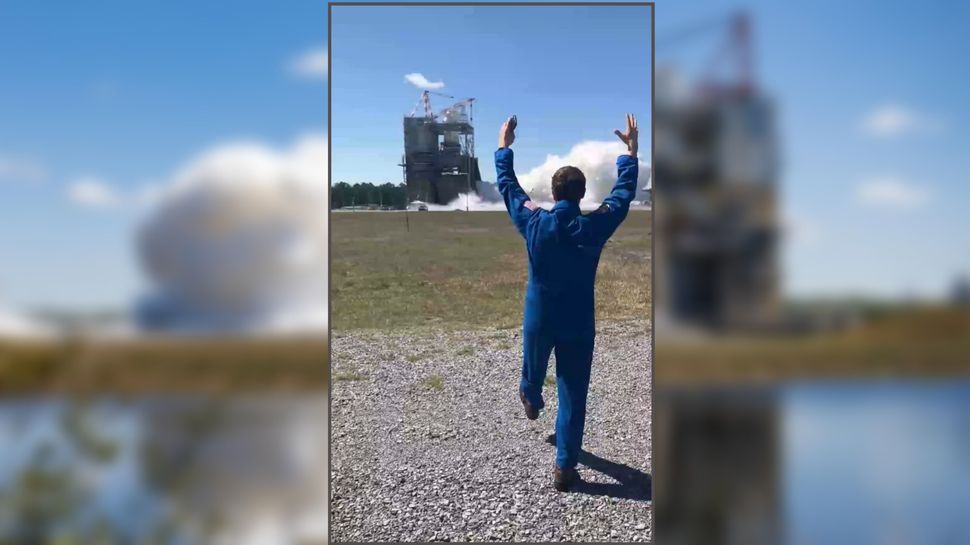NASA’s next moon mission commander raised his hands in celebration during a powerful rocket engine test.
Artemis 2 commander Reid Wiseman, a NASA astronaut, was caught on video during the recent testing of the RS-25 engine that will power future versions of the Space Launch System (SLS) rocket for moon missions.
NASA captured Wiseman and his Artemis 2 crewmate Christina Koch in Mississippi at NASA’s Stennis Space Center on March 6, and shared the astronauts enjoying the dramatic view on X (formerly Twitter) a few days later.
The dramatic, 10-minute test is meant to test the engine for excursions “on future Artemis missions to the moon and beyond,” NASA officials wrote in a separate press release.
Related: NASA fires up powerful Artemis moon rocket engine in key test (video)

The RS-25 is a veteran engine type, having been used in the space shuttle program for a generation. Flown space shuttle engines were used on an uncrewed moon excursion, Artemis 1, in 2022. The same will happen with Artemis 2, which will launch four astronauts around the moon in 2025, and the future moon-landing missions Artemis 3 and Artemis 4.
Artemis 5 and later missions, however, aim to use new variants of the RS-25 that will have additional thrust available. That’s a big impetus behind the 12-test series that is ongoing in 2024 to certify the new RS-25 type.
“Engineers are collecting test data to certify an updated engine production process, using innovative manufacturing techniques, for lead engines contractor Aerojet Rocketdyne, an L3Harris Technologies company,” NASA officials wrote of the March 6 test, the ninth of 12 in the planned series.
“During the March 6 test, operators fired the certification engine for 10 minutes [or] 600 seconds, longer than the amount of time needed to help launch the SLS rocket and send astronauts aboard the Orion spacecraft into orbit,” NASA officials continued, referring to a typical eight-minute launch for SLS.
The team also tested engine power levels between 80% and 113% “to test performance in multiple scenarios,” officials added.
The four Artemis 2 astronauts are commander Wiseman, mission specialist Koch (who will become the first woman to leave low Earth orbit, or LEO), NASA pilot Victor Glover (who will become the first Black person beyond LEO), and Canadian Space Agency mission specialist Jeremy Hansen (the first non-American).
Artemis 2 and successor mission Artemis 3 were both delayed earlier this year for numerous technical reasons, with Artemis 2 pushing nine months later to September 2025 and Artemis 3 delaying about a year to September 2026. The Artemis 3 crew has not yet been named by NASA.
All Artemis missions aim to meet the bold goals of the Artemis program, which aims to establish a long-term settlement near the moon’s south pole, where water ice is thought to be abundant. The NASA-led Artemis Accords have 35 signatories that commit to following U.S.-led peaceful space exploration norms. Some of those countries are direct contributors to Artemis through hardware in exchange for mission opportunities.